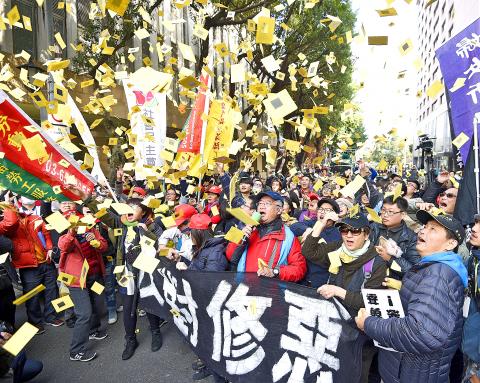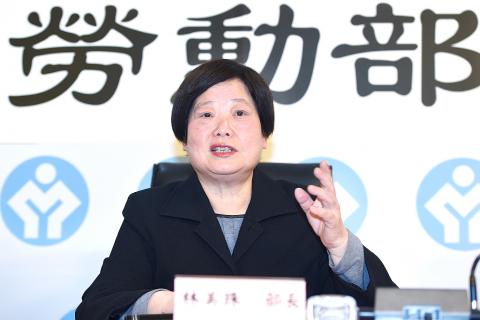The Ministry of Labor (MOL) yesterday said that President Tsai Ing-wen (蔡英文) has kept her campaign promise about reducing work hours, adding that the labor law amendment allows more flexibility for workers and businesses.
“President Tsai Ing-wen definitely did not break her campaign promise. The amendments to the Labor Standard Act (勞動基準法) did not change the underlying principles of the previous amendments, but only added more flexibility,” Minister of Labor Lin Mei-chu (林美珠) told a news conference at the ministry in Taipei.
The amendments allow for special circumstances in which employees can work up to 12 days consecutively, with a minimum rest time of eight hours between shifts and a monthly maximum overtime of 54 hours, on the condition that workers and employers agree to the conditions.

Photo: Chen Chih-chu, Taipei Times
Certain cases of special circumstances would require approval from regulatory authorities.
“The special circumstances will definitely not become the norm,” Lin said, adding that under normal circumstances workers would still have at least one day off every seven days, and their work hours, maximum overtime and overtime pay would essentially remain the same.
The ministry said it would look into regulations and measures necessary to supplement the amendment to better protect workers’ rights and develop mechanisms to ensure that special cases that have been allowed conform with rules about special circumstances.

Photo: Liao Chen-huei, Taipei Times
It would also improve the labor inspection system, and pay special attention to state-run enterprises and sectors that deal with public safety, such as transportation and healthcare sectors, when carrying out labor inspections, the ministry said.
“Last year, the ministry carried out more than 20,000 inspections and fined employers a total of nearly NT$200 million [US$6.76 million],” Occupational Safety and Health Administration Director Tzou Tzu-lien (鄒子廉) said, adding that when the amendments take effect on March 1, the ministry will continue to carry out inspections and increase the public’s understanding of the new rules.
“We dare not say the new labor law is perfect, but we have been working hard to protect workers’ rights,” Lin said.
Labor groups yesterday ended a three-day protest outside the Legislative Yuan after vowing to depose Democratic Progressive Party (DPP) legislators who supported the amendments.
Labor groups, including the Taoyuan Confederation of Trade Unions (TCTU), Taiwan Higher Education Union, the Hsinchu County Confederation of Trade Unions and the Confederation of Taipei Trade Unions, had been protesting the amendment since Monday by marching around the Legislative Yuan.
After the amendments were passed yesterday morning, protesters marched on to the legislature from their tents on Qingdao E Road and threw joss paper at the building.
The DPP has chosen to side with capitalists because of the political donations they receive from the corporations, a protester said.
“Since the DPP loves money so much, we are giving them all our joss money,” the protester said.
Protesters blamed Tsai for breaking her campaign promise and shouted that Tsai, Premier William Lai (賴清德) and DPP legislators are “murderers” for allowing more workers to die from overwork.
They also stopped by the Executive Yuan, where they threw joss paper into the air and some scuffled with police.
Before announcing the end of their protest at about 11:30am, the groups returned to the Legislative Yuan and tried throwing joss paper and smoke bombs into the building.
Labor groups would continue fighting even though the protest has ended, TCTU secretary Wu Chia-hung (吳嘉浤) said.
“One by one, we will depose every DPP legislator who supported the amendments,” Wu said.

Trips for more than 100,000 international and domestic air travelers could be disrupted as China launches a military exercise around Taiwan today, Taiwan’s Civil Aviation Administration (CAA) said yesterday. The exercise could affect nearly 900 flights scheduled to enter the Taipei Flight Information Region (FIR) during the exercise window, it added. A notice issued by the Chinese Civil Aviation Administration showed there would be seven temporary zones around the Taiwan Strait which would be used for live-fire exercises, lasting from 8am to 6pm today. All aircraft are prohibited from entering during exercise, it says. Taipei FIR has 14 international air routes and

Taiwan lacks effective and cost-efficient armaments to intercept rockets, making the planned “T-Dome” interception system necessary, two experts said on Tuesday. The concerns were raised after China’s military fired two waves of rockets during live-fire drills around Taiwan on Tuesday, part of two-day exercises code-named “Justice Mission 2025.” The first wave involved 17 rockets launched at 9am from Pingtan in China’s Fujian Province, according to Lieutenant General Hsieh Jih-sheng (謝日升) of the Office of the Deputy Chief of the General Staff for Intelligence at the Ministry of National Defense. Those rockets landed 70 nautical miles (129.6km) northeast of Keelung without flying over Taiwan,

City buses in Taipei and New Taipei City, as well as the Taipei MRT, would on Saturday begin accepting QR code payments from five electronic payment providers, the Taipei Department of Transportation said yesterday. The new option would allow passengers to use the “transportation QR code” feature from EasyWallet, iPass Money, iCash Pay, Jkopay or PXPay Plus. Passengers should open their preferred electronic payment app, select the “transportation code” — not the regular payment code — unlock it, and scan the code at ticket readers or gates, General Planning Division Director-General Liu Kuo-chu (劉國著) said. People should move through the

The Ministry of National Defense (MND) today released images of the military tracking China’s People's Liberation Army (PLA) movements during the latest round of Chinese drills around Taiwan. The PLA began "Justice Mission 2025" drills today, carrying out live-fire drills, simulated strikes on land and maritime targets, and exercises to blockade the nation's main ports. The exercises are to continue tomorrow, with the PLA announcing sea and air space restrictions for five zones around Taiwan for 10 hours starting from 8:30am. The ministry today released images showing a Chinese J-16 fighter jet tracked by a F-16V Block 20 jet and the